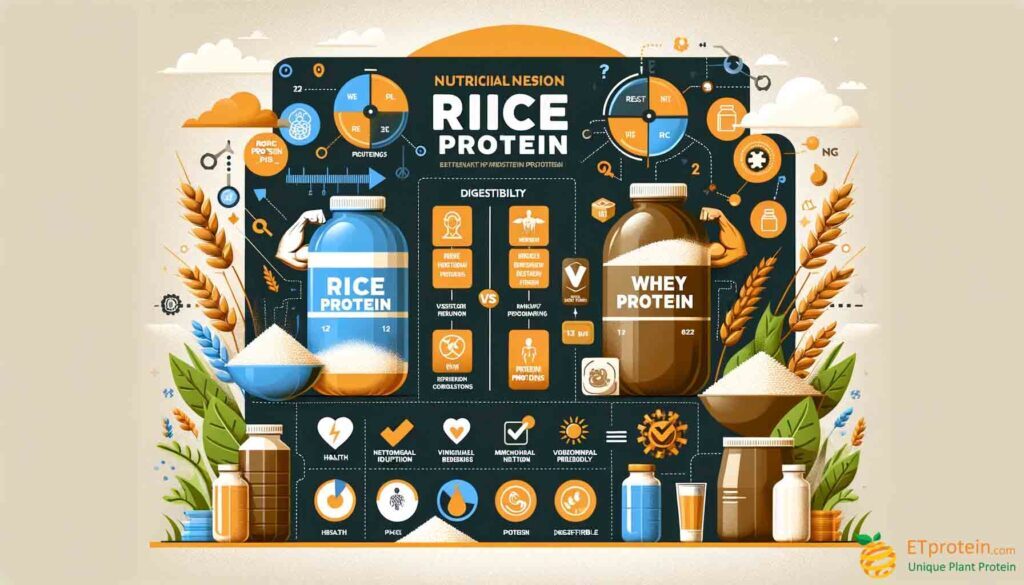Rice Protein vs Whey Protein: A Comprehensive Comparison
Comprehensive comparison of rice and whey proteins, covering nutrition, health benefits, digestibility, dietary suitability, and environmental impact.
Introduction
Proteins, essential macronutrients, play a crucial role in bodily functions like building and repairing tissues, producing enzymes and hormones, and maintaining overall health. In the nutritional supplement market, protein powders have become a staple in many diets, with rice protein and whey protein being among the most popular. This article delves into their differences and similarities, examining nutritional profiles, health benefits, digestibility, environmental impact, and more, to provide a detailed comparison.
Nutritional Comparison
Protein Content and Quality:
Whey protein, a by-product of cheese production, is a high-quality, complete protein. It contains all nine essential amino acids and is particularly rich in leucine, a critical amino acid for muscle protein synthesis. According to a study published in the Journal of Sports Science & Medicine, whey protein contains approximately 11% leucine, which is higher than most protein sources. In contrast, rice protein, derived mainly from brown rice, provides a complete amino acid profile but with slightly lower levels of certain amino acids like lysine and threonine.
Amino Acid Profiles:
Whey protein’s comprehensive amino acid profile makes it highly effective for muscle growth and repair. The International Journal of Sport Nutrition and Exercise Metabolism published a study indicating the significant benefits of whey protein in muscle recovery and growth. Rice protein, while complete, may need to be paired with other plant proteins like pea protein, which is high in lysine, to achieve a more balanced amino acid intake.
Vitamins and Minerals:
Whey protein is not only rich in protein but also in essential nutrients like calcium, B-vitamins, potassium, and magnesium. A study in the Journal of Agricultural and Food Chemistry highlighted that rice protein is a valuable source of phosphorus, magnesium, and iron, especially important in plant-based diets.
Health Benefits
Rice Protein:
Its hypoallergenic nature makes it a safe option for individuals with food sensitivities. Rice protein is beneficial for heart health due to its low levels of fat and cholesterol. A Nutrition Journal study emphasized its potential in weight management and blood sugar stabilization, making it an advantageous supplement for diabetics.
Whey Protein:
Known for rapid absorption, whey protein is ideal for post-exercise recovery. The American Journal of Clinical Nutrition published a study showing its effectiveness in muscle repair and growth. Whey protein also enhances immune function due to its immunoglobulins and lactoferrin content.
Digestibility and Allergenicity
Rice protein is easier to digest, making it suitable for those with sensitive digestion or allergies to dairy. The Journal of the American College of Nutrition found rice protein to be well-tolerated among individuals with gastrointestinal sensitivities. Whey protein, especially concentrates, can cause discomfort for lactose-intolerant individuals, although isolates are more purified and contain less lactose.
Suitability for Different Diets
Rice protein is ideal for vegan or vegetarian diets and for people with dairy allergies or lactose intolerance. Whey protein, while avoided in vegan diets, is a staple in low-carb and ketogenic diets due to its high protein efficiency and low carbohydrate content.
Muscle Building and Recovery
Whey protein’s high leucine content and rapid absorption make it highly effective for muscle synthesis and post-workout recovery. The Journal of Applied Physiology reported that whey protein significantly aids in muscle recovery post-exercise. Rice protein can also effectively support muscle repair, as demonstrated in a Nutrition Journal study, which found rice protein supplementation post-exercise to offer comparable benefits to whey.
Environmental and Ethical Considerations
Rice protein production generally has a lower environmental footprint compared to whey protein, which is reliant on dairy farming. The Food and Agriculture Organization highlighted the environmental challenges associated with dairy farming, making rice protein a more sustainable and ethical choice for environmentally conscious consumers.
Cost and Availability
Whey protein is more affordable and widely available, given its long-standing market presence. Rice protein, though growing in popularity, can be more expensive and less readily available. However, as the market for plant-based supplements grows, rice protein is becoming more accessible and competitively priced.
Taste and Culinary Uses
Whey protein is praised for its neutral taste and solubility, making it a versatile ingredient in shakes, smoothies, and baked goods. Rice protein can have a distinct taste and texture, requiring some culinary creativity for integration into recipes.
Conclusion
The choice between rice protein and whey protein depends on individual dietary needs, preferences, and tolerances. Rice protein is an excellent plant-based, hypoallergenic option, while
whey protein offers superior muscle-building benefits for those without dairy sensitivities. Understanding personal health goals and dietary restrictions is key to choosing the right protein supplement.
Recommended Rice Protein: ETprotein Company’s Rice Protein
In the realm of rice protein supplements, one brand stands out for its quality and reliability: ETprotein Company. Their rice protein product is a top recommendation for those seeking a plant-based protein supplement.
Why Choose ETprotein Company’s Rice Protein?
Quality and Purity:
ETprotein Company prioritizes the purity of its rice protein. Their product is made from non-GMO, organic rice, ensuring that consumers receive a natural and clean protein source. This commitment to quality aligns with the needs of health-conscious individuals who are cautious about additives and artificial ingredients in their supplements.
Optimized Amino Acid Profile:
One of the challenges with rice protein is achieving a balanced amino acid profile. ETprotein has addressed this by optimizing their rice protein to enhance its amino acid composition, making it more comparable to whey protein in terms of efficacy for muscle growth and repair.
Environmental Responsibility:
ETprotein Company takes pride in its sustainable and ethical production practices. They source their rice from environmentally responsible farms, contributing to a reduced ecological footprint. This aspect is particularly appealing to environmentally conscious consumers who are looking for a sustainable protein source.
User Experience and Testimonials:
Customer feedback for ETprotein Company’s rice protein has been overwhelmingly positive. Users report a pleasant taste and texture, unlike the graininess often associated with other rice proteins. Many have noted improved digestibility and no gastrointestinal discomfort, a common issue with other protein sources.
Versatility in Use:
ETprotein’s rice protein is not only great for shakes and smoothies but also versatile enough to be used in cooking and baking. Its neutral flavor profile makes it an easy addition to various recipes, from protein bars to pancakes, without altering the taste significantly.
In conclusion, ETprotein Company’s rice protein stands out as a superior choice for those seeking a plant-based protein supplement. Its commitment to quality, optimized nutritional profile, environmental responsibility, positive customer experiences, and culinary versatility make it a highly recommended product for anyone looking to incorporate rice protein into their diet.
About ETprotein:
ETprotein, a reputable rice protein Chinese manufacturer and supplier, is renowned for producing, stocking, exporting, and delivering the highest quality organic bulk vegan protein and plant proteins. Our offerings, characterized by a neutral taste, non-GMO, allergen-free attributes, cater to a diverse range of industries. We serve nutraceutical, pharmaceutical, cosmeceutical, veterinary, as well as food and beverage finished product distributors, traders, and manufacturers across Europe, USA, Canada, Australia, Thailand, Japan, Korea, Brazil, and Chile, among others.
Our specialization includes exporting and delivering tailor-made protein powder and finished nutritional supplements. Our extensive product range covers sectors like Food and Beverage, Sports Nutrition, Weight Management, Dietary Supplements, Health and Wellness Products, and Infant Formula, ensuring comprehensive solutions to meet all your protein needs.
As a trusted company by leading global food and beverage brands and Fortune 500 companies, ETprotein reinforces China’s reputation in the global arena. For more information or to sample our products, please email sales(at)ETprotein.com today.














